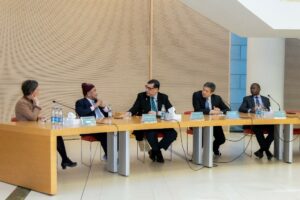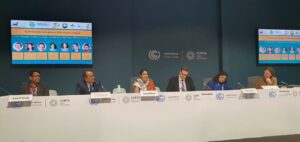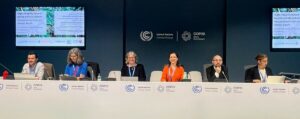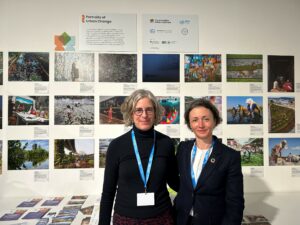IDOS was actively engaged at the 2024 UN Climate Change Conference, bringing its scientific expertise and leveraging its international networks to discuss key climate policy issues. These included the just energy transition, loss and damage finance, nature-based solutions, trade, as well as the integration of climate and sustainable development goals.
14 November: Realising the Just Energy Transition through ambitious and sustainable hydrogen projects (Official Side Event)
As part of a broad stakeholder initiative led by UNIDO and including UNCTAD, UNEP, UNECE, IRENA, AfDB, the Government of South Africa and Dii Desert Energy, IDOS has co-developed sustainability guidelines for large-scale hydrogen initiatives. These guidelines aim to support governments in transparently prioritising project proposals that contribute to national SDG goals and promote a just energy transition. They were presented by UNIDO during an official COP Energy Day side event on 14 November. Prof. Tilman Altenburg joined the panel of experts to discuss the guidelines and the possibilities and challenges of sustainable hydrogen projects. The panellists highlighted the importance of a comprehensive approach to sustainability: the challenging market ramp-up of green hydrogen should not be used to justify a weakening of standards in environmental and resource protection, social responsibility, local value creation or sustainable financing. The panel noted that clear guidelines at country level help define the “goalposts” for stakeholders, fostering trust and confidence among policy makers, financiers, project developers and civil society. This clarity is particularly crucial for a technology that is still relatively new to many. A detailed publication of the guidelines will be made available to the public in the coming months.
15 November: Climate Solutions for Vulnerable Countries
Countries and communities facing the immediate threats from the climate crisis took center stage at the event Climate Solutions for Vulnerable Countries organised by Azerbaijan Technical University, the Asian Development Bank Institute (ADBI) and the Asian Development Bank (ADB). Prof. Anna-Katharina Hornidge joined the event as a speaker on the panel “Solutions for Adaptation”. The panel was moderated by Dil Rahut, Vice Chair of Research at ADBI and kicked-off by a presentation from Fuad Humbatov, Head of the Division of International Cooperation and Climate Change of the NHS of the Ministry of Ecology and Natural Resources of the Republic of Azerbaijan. Anna-Katharina Hornidge was joined on the following panel by Ariunaa Chadraabal, Head of UN Resident Coordinator Office Mongolia, Declan F. Magee, Principal Economist at the ADB Office of the Director General, and Augustine Kenduiwo, Deputy Director of Climate Change Mitigation/Green Growth Transition at Kenya’s Ministry of Environment, Climate Change, and Forestry. The discussion explored innovative solutions for climate adaptation in agriculture, water management, infrastructure resilience and disaster risk reduction. Anna-Katharina Hornidge in her contributions presented the WBGU (German Advisory Council on Global Change) flagship report “Water in a Heated World”, which clearly outlines how incremental adaptation measures will no longer be sufficient. The report calls for a water-mapping initiative consisting of a scientific platform and a panel of experts, systematic international exchange on effective adaptation and resilience strategies, as well as an International Water Strategy.
17 November: Climate Finance for Vulnerable Countries

©ADBI
Prof. Anna-Katharina Hornidge chaired a roundtable on “Financing Solutions for Loss and Damage” as part of an event on Climate Finance for Vulnerable Countries, co-organised by the Asian Development Bank (ADB), the Asian Development Bank Institute (ADBI) and ADA University. In her opening remarks, she also built on the WBGU report “Water in a Heated World”, which further emphasises the necessity to mobilise and organise funds also for local approaches, with a funding gap existing in particular with regards to private capital in development cooperation funds, with only 1.4% of it allocated to the water and sanitation sector. Anna-Katharina Hornidge then moderated the discussion between Mark Dennis Joven, Philippines’ representative to the Loss and Damage Fund board, Adil Najam, President of the World Wildlife Fund (WWF), Albert Park, Chief economist at ADB, and Francis Mwesigye, Chief Economist at Uganda Development Bank. The panel in particular aimed to spotlight potential resolutions by highlighting out-of-the-box ideas such as integrated approaches that combine micro and macro policies and regulations.
18 November: Governance for strengthening SDG-climate synergies (Official Side Event)

The German Advisory Council on Global Change (WBGU) co-hosted an official Side-Event on “Governance for Strengthening SDG-Climate Synergies” on November 18, together with The Energy and Resources Institute (TERI), TERI School of Advanced Studies (T-SAS), the Bangladesh Environmental Lawyers Association (BELA) and the Asia Society Policy Institute (ASPI). The side event focussed on the need to overcome silo approaches and fragmented governance systems and instead find integrated and holistic governance approaches for climate action and implementation of the 2030 agenda. As a Council Member of the WBGU, Anna-Katharina Hornidge delivered the framing presentation after introductory remarks by Dr Vibha Dhawan (TERI) and before a high-level statement by Syeda Rizwana Hasan, Hon’ble Adviser, Ministry of Environment, Forests and Climate Change and Ministry of Water Resources, Government of Bangladesh. In her framing presentation, Anna-Katharina Hornidge illustrated the interlinkages between climate action and the Agenda 2030, with a focus on SDG 6 “Clean Water and Sanitation for all”. As outlined in the WBGU’s flagship report “Water in a Heated World”, 30-50% of the world’s population will be affected by water scarcity in cities in 2050 and water quality, too, is expected to decline if no urgent action is taken. The subsequent panel discussion was moderated by Anna-Katharina Hornidge and featured inputs on “SDG Climate Synergies and Multilateralism” (by Shailly Kedia & Gopal Sarangi; TERI and TERI-SAS), on “Just Transition in India with an Effective Carbon Credit Trading Scheme” (by Alistair Ritchie, Asia Society Policy Institute), and on Financing locally led adaptation in urban areas (by Dr Md. Golam Rabbani, BRAC).
20 November: High-integrity nature-based climate action: Perspectives from the Global South (Official Side Event)

©Photo: Juliane Freitas, Boticario foundation
IDOS co-hosted the official UNFCCC Side Event: High-integrity nature-based climate action: Perspectives from the Global South at COP29. The event brought together researchers (York University, Radboud University, IDOS), practitioners (Boticario foundation) and funders (BMZ, Sitawi) to discuss ambition, equity and the scaling of initiatives that integrate climate and biodiversity goals. It provided a dialogue for North-South and South-South collaboration. Experiences and best practices were showcased with local and regional examples of initiatives. In her intervention, Prof. Ines Dombrowsky provided insights from social science research at IDOS on Nature-based Solution (NbS) projects in Latin America. She stressed that NbS are more likely to be beneficial for local communities, if they ensure distributional, procedural and recognition justice and if communities have adequate governance arrangements in place. At the same time, it is often not poor local communities but powerful economic and political actors who are the main drivers of ecosystem degradation. The events discussion focussed on dealing with power aspects related to NbS and adaptation projects as well as on opportunities and challenges in monitoring NbS outcomes, in providing direct access of local communities to funding sources and in scaling successful initiatives.
20 November: The Declaration on the Use of CBAM Revenues
Prof. Clara Brandi spoke during a side-event on “The Declaration on the Use of CBAM Revenues” (20 November 2024 – 18:00-19:00, Ukraine Pavilion), organised by the European Roundtable on Climate Change and Sustainable Transition (ERCST). In 2026, the EU’S Carbon Border Adjustment Mechanism (CBAM) will incur a financial obligation on importers and also begin yielding revenue. Not only will the revenue collected under the CBAM increase as the mechanism is gradually phased in over the course of nearly a decade, but the simultaneous phasing out of free allocation will also increase the revenue generated from allowance auctioning under the EU ETS. The goal of this side event was to elaborate on possible options for EU CBAM revenue use. Though panellists had different perspectives on who should receive revenues how, all agreed that CBAM revenue recycling should take place, for example, to bear the implementation costs of CBAM beyond the EU. Since revenue recycling continues to be controversial in the EU, the goal of the side-event was to raise awareness for the importance of revenue recycling, especially in light of the principle of CBDR.
Transformative Urban Coalition’s (TUC) 2024 Photo Exhibition

©Ines Dombrowsky
Prof. Ines Dombrowsky and Prof. Anna-Katharina Hornidge visited the Transformative Urban Coalition’s (TUC) 2024 Photo Exhibition, which showcased the entries to this year’s photo competition. Under the theme „Portraits of Urban Change“ the photographers focused on transforming cities through community power, showcasing revitalised areas, clean energy projects, sustainability education and circular economy initiatives. The submissions illustrate efforts to harmonise urbanisation with capacity-building and climate narratives. Each photograph’s compelling story will inform UNU-EHS research on perceptions of urban transformation through art and photography.
TUC supports cities in achieving zero carbon emissions by 2050 through transforming their social, technological, and political systems. The project currently operates in five Latin American cities, working to develop strategies that address urban development challenges and inequality while reducing carbon emissions. TUC is a coalition between United Nations University – Institute for Environment and Human Security (UNU-EHS), German Institute of Development and Sustainability (IDOS), World Resources Institute (WRI) and International Institute for Environment and Development (IIED), with support from Germany’s Federal Ministry of Economic Affairs and Climate Action.
Read the blog post by Svea Koch, Mariya Aleksandrova and Steffen Bauer here: COP29’s Decision on the New Climate Finance Goal – the Fine Line Between Compromise and Compromising

Schreibe einen Kommentar